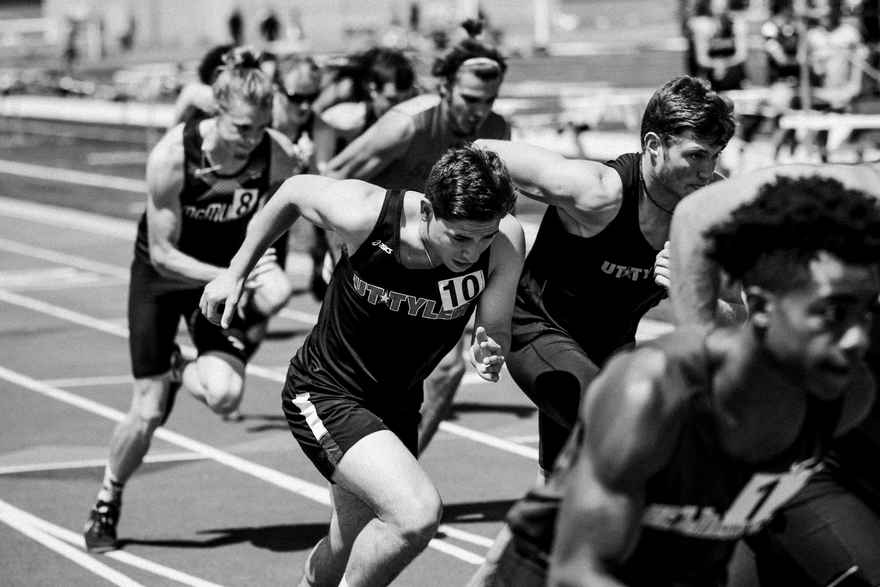
We’ve all seen it: the over-the-top parent at school sports day or pitch/trackside ‘coaching’ their kid … usually from a place of zero knowledge but an overwhelming desire for them to do well. But is this affecting the child, and have you ever considered how you support your child?
How Other Parents See Us
A quick glance around during any competition will provide plenty of examples of who you'd rather not be!
We can still recall the internal cringing we felt during a competition over a decade ago. The excessively verbal, proud parent had the body language that yelled, ‘Look how wonderful my child is.’ We could visibly see the poor child dying a million embarrassment deaths as other athletes looked on in disbelief. The innate urge to intervene, to end the athlete's pain, was real but, of course, impossible.
Thankfully, and surprisingly, the ‘child’ in question is still competing to this day and has reached a high level, but I do still wonder whether she was affected, especially regarding social confidence, as she remains a bit of a loner.

Showing You Care
Showing your child that you care, are there for them, and are proud of them can boost their self-esteem and confidence. But, too much support or expressing this too publicly can, it seems, be counterproductive and even damaging. Some points to consider:
-
You don’t want to cause them embarrassment if other kids notice your over-the-top support and take it upon themselves to comment...
-
You also don’t want this to result in negative press regarding you as a person, as this could impact your popularity amongst other parents.
The challenge, therefore, is to be aware of the ‘invisible line’ between enough and too much and endeavour not to cross it. This doesn’t mean never shouting encouragement. DO THIS because this is what being a proud parent is all about.
Taking a moment to consider what you would think of another parent
can provide some clues
However, considering how you would feel if you saw another parent acting this way can indicate whether your actions are within the safe zone.
Can Over-The-Top Support Affect Your Child?
According to research, the answer is yes, sometimes it can.
Several studies have investigated the psychological impact over-enthusiastic parents can have on their children. Almost always, this overzealous support comes from a genuinely caring place, with parents oblivious to the damage they may be inadvertently causing.
However, it’s important to remember that every child is different. One child might love loud and effusive parental encouragement from the stands, whilst for another, this behaviour could cause genuine embarrassment and anxiety.

(Katarina Johnson-Thompson's Mum, Tracey, writes a heartwarming note to her daughter before the Rio 2016 Olympic Games. (Photo by Ian Walton/Getty Images)
Support Kids Want
As parents, you know your child best and, in theory, are ideally positioned to gauge what style of support is right for your child. But making an assumption based on what you think can be risky.
Asking them if they mind you shouting support is by far the best strategy. I did this with Joe, and amusingly, his response was, “What shouting? I don’t hear anything when I’m racing”! This was handy to know because, if I’m really honest, the trauma I had to endure listening to myself shouting when we played the race videos back was a good enough reason to stop. So, I did!!
Be prepared for an honest but unwanted reply, though. Some will say, "I hate it" or "It's embarrassing", in which case toning down your support would be a helpful and considerate response that demonstrates you consider their feeling.
Support Others Too
Limiting your interest and support to your own child’s performance can stand out a mile... and not in a good way. Showing a genuine interest in the performances of other people’s kids is a surefire way of helping you and your child's friendships and popularity. In fact, research has shown that young athletes’ enjoyment of their sport and motivation improves when their parents (1):
-
Congratulate other athletes. Young athletes especially get a real kick out of positive comments from someone else’s mum or dad!
-
Talk to other parents about their child and show a genuine interest.
-
They are generally supportive and friendly towards other athletes' parents.

Image by Kenny Eliason
Challenging Decisions
Unfortunately, disappointment is unavoidable in sports; only one person or team can win, leaving the rest to process loss. However, there can be scenarios where you question the end result or the official's decision. In these situations, it's essential to keep these feelings in check no matter how frustrated (or angry) you may feel.
Angry parental outbursts can potentially cause serious embarrassment and anxiety, especially if conducted in front of your child, their fellow athletes and/or other parents. I can still recall, in intricate detail, an ‘incident’ that played out in front of an entire stadium… it wasn’t pretty and was the stuff of nightmares for every young athlete! The athlete in question was visibly mortified by his mother's rant!
Despite the overwhelming urge to protest a questionable result against our own child, we have to remind ourselves that we and, far more importantly, them, will likely need to face these same athletes and parents at other competitions… not a great prospect for anyone but definitely enough to cause a young athlete anxiety.
(1) Harwood, C.G., Knight, C.J., Thrower, S.N. and Berrow, S.R., 2019. Advancing the study of parental involvement to optimise the psychosocial development and experiences of young athletes. Psychology of Sport and Exercise, 42, pp.66-73. (View paper here)
To go the extra mile to help your child achieve their sporting dreams, check out our
Ultimate Guide To Athlete Parenting
Featuring expert advice and elite athlete insights on nutrition, sleep, psychology, and much more.
VIEW FREE CONTENT BUNDLE or BUY NOW.


Comments